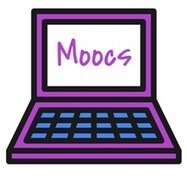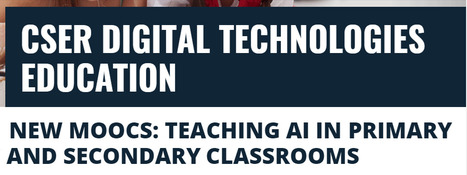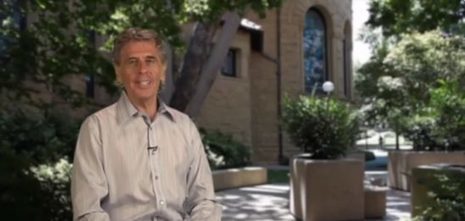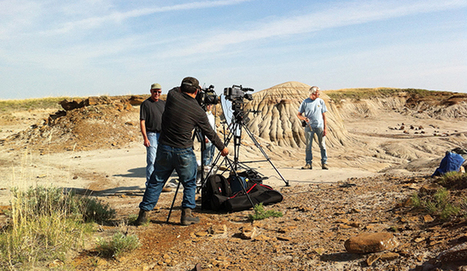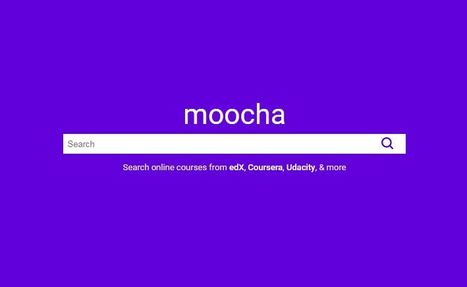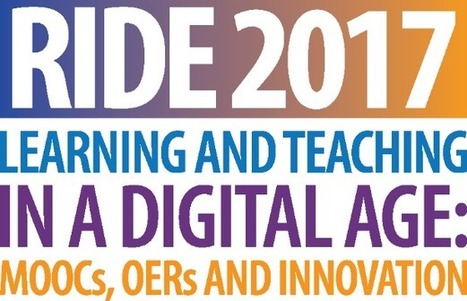 Your new post is loading...
 Your new post is loading...
Moocs required us to rethink how to create open and free courses that would engage large numbers of learners. Over the years, we’ve adapted our services in response to lessons we’ve learnt from our experiments, write Nikki Stuart and Lauren Johnston-Smith
Via Peter Mellow
"We can’t help you with hitting the gym and eating right, but if your 2023 New Year’s resolution is to learn more, Athabasca University has you covered ..."
Via Leona Ungerer
"Six years ago, inspired by a big idea to democratize higher education, the University of Michigan (U-M) became a founding partner of Coursera. Massive open online courses (MOOCs) were born. While the issuance of MOOC death certificates by skeptics is only rivaled in frequency by those filed by South Park writers for Kenny, MOOCs consistently find ways to survive and indeed thrive in nurturing environments."
Via EDTECH@UTRGV, Miloš Bajčetić
The announcements yesterday from Michigan and Rice have actually been in the works for a long time. The three-year "Credits for MOOCs" program "allows students from the participating schools to enroll in specific free online courses from the other member schools and receive transfer credits for passing them." In this post James DeVaney, associate vice provost for academic innovation at the University of Michigan, describes the thinking behind the program. "MOOCs and MOOC derivatives (e.g. Teach-Outs, specializations, MicroMasters, MasterTrack, etc.) are helping universities to expand how they think about engaging with the world," he writes. Related: Coursera introduces its first bachelor's.
Via Miloš Bajčetić
Udacity helped popularize the idea of offering college-level courses online to anyone for free, a format known as MOOCs (for Massive Open Online Courses). But this week a Udacity official called MOOCs “dead,” leading to questions about what that means for one of the company’s offerings (which still include free MOOCs).
It was Udacity vice president Clarissa Shen who this week said “they are dead,” when talking about MOOCs in an interview with The Economic Times in India. “MOOCs are a failed product, at least for the goals we had set for ourselves,” she told the newspaper. “Our mission is to bring relevant education which advances people in careers and socio-economic activities, and MOOCs aren't the way.”
Udacity’s co-founder, Sebastian Thrun, famously announced a “pivot” away from MOOCs back in 2013, and since then the company has focused its energies on paid sequences of courses called “nanodegrees” that it produces in cooperation with large tech employers. But it has continued to offer free versions of its course videos for those who don’t want or need a certificate of completion.
Via Miloš Bajčetić
This paper is pretty loosely written but it within its evaluation of an open online course using a resourcwe storage system it offers a novel interpretation of connectivism to frame an evaluation of this system (and/or to evaluate the students using the system). "Connectivism can be understood in this way: the rapid change of knowledge foundation leads to decision change; the new information is gained continuously; the ability to distinguish important information and non-important information is crucial." The course was actually offered as blended learning, and was evaluated according to five criteria: participation, interaction, fitness, satisfaction and effect. The descriptions of each are unfortunately not very clear. Also worth noting is the conclusion that the blended learning environment did not support interaction very well. This accords with my own experience, specifically, that there is often better (and more) interaction online than in person.
Via Miloš Bajčetić
I've taken a number of free courses in the past few years from Coursera and Canvas.net. I found a number of interesting Summer courses from these two vendors, and listed them below.
Via Becky Roehrs
List of over 300 MOOCs and Online Courses coming up in the month of March 2017 to explore.
Via Tom D'Amico (@TDOttawa)
One of the important outcomes of the growth of open online education has been the development of new campus competencies to evolve and support teaching and learning. MOOCs have provided venues where faculty have the opportunity to collaborate closely with teams of non-faculty educators. Developing a MOOC is a creative endeavor involving faculty, instructional designers, media educators, librarians, developers, assessment experts, and students. We lack, however, a good way of talking about, measuring, or understanding the institutional impact on residential learning of MOOCs. The research on MOOCs being undertaken by a new cadre of data scientists is wonderful. The unit of analysis for this research, however, is almost always contained within the MOOC itself. How can we apply this same rigorous analytical lens to measuring and understanding organizational change? How can we get the sociologists and the assessment experts to take the college and the university as the unit of analysis? Can anyone point to some good research and writing on the impact of open online learning on institutional change, with a specific focus on improving residential learning? What are the higher ed conferences where the same people involved in experiments such as open online learning come to talk about postsecondary institutional change? Where is the social science research where improved residential learning is the dependent variable, and MOOCs are an independent (explanatory) variable? If you are a MOOC practitioner, (someone who has worked on a MOOC team to produce a course), how do you see your MOOC work has supporting a larger goal to improve teaching and learning on your campus?
Via Lucas Gruez, Miloš Bajčetić
Everything we know about where the higher education mission is headed today indicates that the notion of the student as a customer is becoming dominant in this trade-off and a big part of me is pained by the fact that, for example, the humanities and liberal arts are the losers, and with them, the pursuit of learning for its sake. But it seems impossible to head off this overwhelming demand for measurable value-added in the credential and the almost totally consumer-driven approach to postsecondary study, with its MOOCs, competency-based credit, the $10K BA, etc. Can we have it both ways?
Via Miloš Bajčetić
Por Kiberly Allen. Abril 2, World Economic Forum Hoy, un equipo conjunto de investigación de MIT y la Universidad de Harvard publicó una de las mayores investigaciones de cursos abiertos masivos online (MOOCs) a la fecha. Basándose en el trabajo previo de estos investigadores – un informe de enero de 2014 que describe el primer…
Via Juan Jesús Baño Egea
|
CT asks Anant Agarwal about lifelong learning and how edX connects individuals to education whatever their career or life stage.
Via Peter Mellow
Artificial Intelligence (AI) is driving the next wave of technological innovation and is changing almost every industry around us. With the expansion and ubiquity of AI being a motivating factor in the decisions and need for all children to develop their understanding of Computer Science, it is logical that children also must need to develop their understanding of AI itself.
We have two free teacher professional development MOOCs in AI available to suit your year level: Teaching AI in the Primary Classroom and Teaching AI in the Secondary Classroom.
Our AI courses are presented in two related parts. Firstly, we provide school teachers with an overview of AI, unpacking AI and key concepts across both MOOCs. The second half of our AI MOOCs are specific to the year level you have selected (primary or secondary). In these units, we present the practical implementation of classroom activities that engage students in learning about AI, including support for teachers about the design and assessment of learning activities. You may complete one or both primary and secondary courses!
From the 21st of June, our "Overview" units will be available to access, with the second half of the course being available in July. Registration is now open!
Via John Evans
This study has received a lot of attention, being reported in many different outlets. The main reporting suggests that discussions in online learning are strongly biased, with more attention being paid to white male students by instructors, and white female students more likely to correspond with or respond to other white females. I don’t dispute these findings, as far as they apply to the 124 MOOCs that the researchers studied.
Where the madness comes in is then generalising this to all online courses. This is like finding that members of drug gangs in Mexico are likely to kill each other so the probability of death by gunfire is the same for all Mexicans.
MOOCs are one specific type of online learning, offered mainly by elitist institutions with predominantly white male faculty delivering the MOOCs. Furthermore, the instructor:student ratio in MOOCs is far higher than in credit-based online learning, which still remains the main form of online learning, despite the nonsense spouted by Stanford, MIT and Harvard about MOOCs. In an edX or Coursera MOOC, with very many students, it is impossible for an instructor to respond to every student. Some form of selection has to take place.
Via Miloš Bajčetić
On the 10th anniversary of the first massive open online course, they are more numerous than ever.
In 2008, University of Manitoba professors Stephen Downes and George Siemens taught a course on learning theory that was attended by about 25 paying students in class and by another 2,300 students online for free. Colleague Dave Cormier at the University of Prince Edward Island dubbed the experiment a “massive open online course,” or MOOC.
Since then, this learning mode has been through a dynamic roller-coaster ride. It became an object of much hype (a 2012 New York Times article was titled “The Year of the MOOC”) and then faded from the scene (a 2017 Inside Higher Ed blog post decreed “MOOCs are ‘Dead’”).
Actually, on the 10th anniversary of that first MOOC, they’re still quite alive. “The numbers suggest MOOCs are, in fact, here to stay,” said Arshad Ahmad, vice-provost, teaching and learning, at McMaster University and director of the university’s MacPherson Institute for Innovation and Excellence in Teaching and Learning. Dr. Ahmad also teaches a five-course specialization MOOC called Finance for Everyone.
Via Miloš Bajčetić
I can answer that question from my own experience. It's really hard to put hundreds of people, let alone thousands, into a live interactive streaming conference. This article doesn't seem to recognize that difficulty. "It’s possible—in a course with scheduled lectures—for students to tune in, listen to a lecture in real time, ask questions, and participate in discussion from a remote location." Well yes, it's possible, but not in video. We've had interactive sessions in things like Big Blue Button or Google Hangouts, but you have to limit the number of participants. This means that the rest are relegated to tyoing comments in the chat. That's what Arc - touted in this article - also does. But even that can get out of hand if you have thousands of participants.
Via Miloš Bajčetić
Search for MOOCs and online courses from platforms including Coursera, edX, MIT OpenCoursWware, Udacity, and Futurelearn.
Via Elizabeth E Charles
The Centre for Distance Education at the University of London has held an annual conference under the ‘RIDE’ strapline almost every year since its institution in 2005. These meetings have become a popular fixture in academics’ and learning technologists’ calendars in and beyond London, and this year’s, held at Senate House on Friday March 24th, was very well received. It was ably chaired by two CDE Fellows, Stylianos Hatzipanagos of King’s College London and Alan Tait from the Open University, and the programme included speakers from as far afield as the Universities of Plymouth and Lorraine (France) as well as many home-grown London ones.
Via Elizabeth E Charles
Last week I wrote a post on ‘students as customers’ in the context of a more corporatised, commoditised Higher Education market. It was interesting then to see another post today discussing the emerging trend of employers dropping requirements for degrees as part of their recruitment criteria, instead selecting candidates
Via Miloš Bajčetić
Universities must embrace digital learning or face losing out to competitors, according to the head of the UK’s massive open online course platform.
FutureLearn chief executive Simon Nelson said that, while the campus-based degree would “always have its place”, there was “no room for complacency”.
In a lecture to the Royal Society for the encouragement of Arts, Manufactures and Commerce (RSA), he argued that institutions that did not grasp the potential of online learning would be overtaken by rival providers.
“Universities need to recognise that though the prize may today seem tiny next to their core business, things are only going in one direction,” Mr Nelson said. “The sooner they go through the organisational pain of putting digital first in every area, the sooner leadership can be established in a rapidly changing market.”
Via Elizabeth E Charles
I had thought we’d seen the back of the whole disruption nonsense. Audrey Watters exposed it as a myth ages ago, I’ve written about how it influenced the whole MOOC narrative, and even Forbes don’t like it. So it was with a weary sigh that I noticed Richard Branson had organised an event called “Disruptors -The Future of Education: Does the Current Model Make the Grade?“. This featured the Khan Academy, Pearson and Teach For All.
I didn’t watch any of the event, maybe there were some very interesting presentations. But by labelling it Disruptors, the intention is made clear. Disruption, as set out by Christensen, is in fact very rare. I think it only actually applies about 1% of the time that term is claimed. But Christensen wouldn’t get rich by talking about a rare occurrence so has pushed the idea that it happens everywhere. The replacement of analogue photography by digital is the classic example. That really was disruption and swept away a whole industry. When it does happen, the thing about disruption is that it is absolutely brutal. A whole industry is replaced by a new one. This is not making improvements (that is the sustaining technology), it is completely destroying a sector and replacing it with a new one. It is an extinction event.
If you are claiming disruption then, you believe the following three things:
1. A complete, systemic change will overtake the sector
2. The current incumbents will not survive
3. The current incumbents are incapable of dealing with the new world, which will be populated by new entrants.
This is what disruption means. If you don’t believe this, then it’s not disruption. It may be technology innovation, it may be new hybrid models, but it’s not disruption. Now look at that list and ask yourself if we want that for education? It would mean the closure of schools, thousands of teachers redundant, and education run by new providers. Maybe it will be a better system, but that is a hell of a lot of, well, disruption.
Via Julie Tardy, Miloš Bajčetić
The participants of #NumericalMOOC will have noticed that we made only one video for the course. I thought that maybe I would do a handful more. But in the end I didn’t, and I don’t think it matters too much.
Why didn’t we have more videos? The short answer is budget and time: Making good-quality videos is expensive, and making simple yet effective educational videos is time consuming, if not necessarily costly.
Via Peter Mellow, Miloš Bajčetić
MOOCs are usually taken by college students or adults, but the are compelling reasons they may make sense for high school students.
Via Miloš Bajčetić
|



 Your new post is loading...
Your new post is loading...










